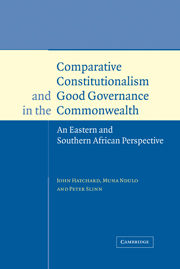 Comparative Constitutionalism and Good Governance in the Commonwealth
Comparative Constitutionalism and Good Governance in the Commonwealth Book contents
- Frontmatter
- Contents
- Preface
- List of cases
- List of constitutions
- List of statutes
- List of other instruments
- Map
- Introduction
- 1 The democratic state in Africa: setting the scene
- 2 Constitutions and the search for a viable political order
- 3 Devising popular and durable national constitutions: the new constitutions of the 1990s
- 4 Perfecting imperfections: amending a constitution
- 5 Presidentialism and restraints upon executive power
- 6 Enhancing access to the political system
- 7 Making legislatures effective
- 8 The judiciary and the protection of constitutional rights
- 9 The devolution of power to local communities
- 10 Developing autochthonous oversight bodies: human rights commissions and offices of the ombudsman
- 11 Seeking constitutional control of the military
- 12 Constitutionalism and emergency powers
- 13 Constitutional governance: the lessons from southern and eastern experience
- Bibliography
- Index
3 - Devising popular and durable national constitutions: the new constitutions of the 1990s
Published online by Cambridge University Press: 23 June 2009
- Frontmatter
- Contents
- Preface
- List of cases
- List of constitutions
- List of statutes
- List of other instruments
- Map
- Introduction
- 1 The democratic state in Africa: setting the scene
- 2 Constitutions and the search for a viable political order
- 3 Devising popular and durable national constitutions: the new constitutions of the 1990s
- 4 Perfecting imperfections: amending a constitution
- 5 Presidentialism and restraints upon executive power
- 6 Enhancing access to the political system
- 7 Making legislatures effective
- 8 The judiciary and the protection of constitutional rights
- 9 The devolution of power to local communities
- 10 Developing autochthonous oversight bodies: human rights commissions and offices of the ombudsman
- 11 Seeking constitutional control of the military
- 12 Constitutionalism and emergency powers
- 13 Constitutional governance: the lessons from southern and eastern experience
- Bibliography
- Index
Summary
The new ‘winds of change’ in the 1990s brought about dramatic constitutional changes throughout the ESA region. So much euphoria; so much hope. But the question remains as to whether the new constitutions are autochthonous, popular and durable documents that can help give people ‘a better future by establishing a socio-economic and political order … based on the principle of unity, peace, equality, democracy, freedom, social justice and progress’.
The answer depends upon many factors, not the least of which being the political will to make constitutionalism take root in the ESA states. The starting point, however, is to examine the adoption of a national constitution through a process which can affect fundamentally the document's substance and legitimacy. This is the focus here. It is argued that the process must come from the integration of ideas of the major stake-holders in the country including the government, political parties, both within and without Parliament, organs of civil society and individual citizens. It follows that the process is one which the government should neither control nor unduly influence nor should it be a merely formal technical exercise. But it involves the making of a complex bargain between the various stake-holders with often fiercely contested political trade-offs. Further the process must be transparent, i.e. it must be undertaken in full view of the country and the international community. Such a process provides the best opportunity for a state to adopt an autochthonous, popular and durable constitution.
- Type
- Chapter
- Information
- Comparative Constitutionalism and Good Governance in the CommonwealthAn Eastern and Southern African Perspective, pp. 28 - 42Publisher: Cambridge University PressPrint publication year: 2004


